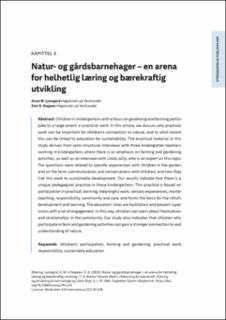Natur- og gårdsbarnehager – en arena for helhetlig læring og bærekraftig utvikling
Chapter, Peer reviewed
Published version
Permanent lenke
https://hdl.handle.net/11250/3120977Utgivelsesdato
2023Metadata
Vis full innførselSamlinger
- Import fra CRIStin [3604]
- Institutt for idrett, kosthald og naturfag [1006]
Originalversjon
https://doi.org/10.23865/noasp.193Sammendrag
Children in kindergartens with a focus on gardening and farming participate to a large extent in practical work. In this article, we discuss why practical work can be important for children’s connection to nature, and to what extent this can be linked to education for sustainability. The empirical material in this study derives from semi-structural interviews with three kindergarten teachers working in kindergartens where there is an emphasis on farming and gardening activities, as well as an interview with Linda Jolly, who is an expert on this topic. The questions were related to specific experiences with children in the garden and on the farm, communication and conversations with children, and how they link this work to sustainable development. Our results indicate that there is a unique pedagogical practice in these kindergartens. This practice is based on participation in practical learning, meaningful work, sensory experiences, master teaching, responsibility, community and care, and forms the basis for the child’s development and learning. The educators’ roles are facilitators and present supervisors with a lot of engagement. In this way, children can learn about themselves and relationships in the community. Our study also indicates that children who participate in farm and gardening activities can gain a stronger connection to and understanding of nature.

